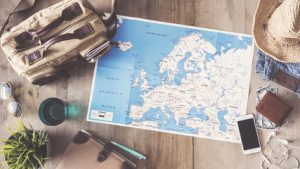Furnace Cleaning West Chester prevents clogging and improves indoor air quality. Dirty furnaces force the system to work harder, leading to a reduction in efficiency and higher energy bills.

To clean the heat exchanger, loosen or remove the access panel and vacuum the burners, blower and housing with a crevice tool attachment on your shop vacuum. Be sure to vacuum the vent ducts too.
A furnace heat exchanger contains the dangerous combustion gases that result from fuel burning, while also warming and redistributing the air in your home. Those gases would otherwise blow directly over your burners and into your house’s airflow, carrying with them carbon monoxide. The heat exchanger’s outside walls get hot and transfer the fuel combustion heat to the air that’s blown over it.
A heat exchanger needs to be cleaned in order to keep it functioning properly. Deposits and contaminants that build up on the heat exchanger surfaces impede fluid flow and prevent proper heating and cooling. Heat exchangers can be cleaned using chemical cleaning agents or high-pressure water jets, depending on the level of contamination.
Regular heat exchanger cleaning is essential to ensure your furnace’s performance and longevity. The recommended minimum is every two years, but more frequent cleaning may be necessary for more intensive use or if your system shows signs of poor operation.
A dirty or malfunctioning heat exchanger can crack under pressure from repeated expansion and contraction of the metal tubes within it. Signs that you have a cracked heat exchanger include strong odors, strange flame color changes, banging or rattling noises when the unit starts up, or the CO alarm in your furnace room going off. If any of these occur, it’s vital that you contact your HVAC technician immediately, open windows and doors to air out your home, turn off the power to your furnace, and seek emergency medical assistance for anyone who might be sickened by inhaling poisonous combustion gases. Replacing a damaged heat exchanger isn’t an easy or cheap task, but it might be the most cost-effective way to restore your home’s comfort and safety.
Blower
Furnace blowers are a key component in pushing clean, warm air throughout your home. However, when a blower motor becomes dirty from dust or debris, it can cause problems like higher energy bills and reduced indoor air quality. The best way to prevent this from happening is by making annual furnace cleaning a part of your home maintenance routine.
When your blower is dirty, it can restrict airflow and lead to a host of issues, including rising energy bills, strange noises, and a reduction in the amount of warm air that is circulated through your ductwork. If you notice any of these issues, it’s time to call a professional for a furnace cleaning.
The basic function of a blower is to convert mechanical energy from an electric motor or engine into kinetic and pressure energy. This occurs through the centrifugal force of a rotating impeller. The incoming air or gas enters the blower through an inlet valve, and then the rotating impeller imparts centrifugal force on it, causing the air to move radially outwards. The displaced air then enters a diffuser, where the velocity slows and is converted back into pressure energy.
If the blower is clogged with debris, it can cause problems with your HVAC system as it tries to force the dirty air through your ductwork. The resulting back-pressure causes your blower to work harder and can lead to overheating, frequent cycling, and increased wear.
During a cleaning, an HVAC technician will shut off power to the furnace and then remove the blower fan and motor assembly from the metal panel in the front of your furnace. They’ll also take a digital picture of the wiring connections to help ensure they reinstall everything properly. Once the blower is cleaned, the HVAC technician will reinstall it in the furnace, reconnect all of the wires according to their digital photo, and then restore power.
Air Filter
The air filter might seem like a minor component to your HVAC system, but these simple cardboard filters play an important role in both indoor comfort and equipment performance. These filters allow conditioned air to be redistributed throughout the home, while trapping harmful dust particles and other contaminants. They also help reduce airborne irritants that trigger asthma and allergies. The type of filter you need will depend on your specific needs and preferences. Some common types of air filters include reusable electrostatic, disposable pleated, and UV light-activated filters.
While cleaning your filter, be sure to turn off your HVAC unit to prevent unfiltered air from circulating during the process. Wash your filter in a bucket of water with a small amount of laundry detergent, then rinse and shake it dry. If your filter is too large to fit inside a sink or bucket, you can use the garden hose to wash it. Be sure to dry the filter completely before replacing it in your vents, ensuring that its arrow markings are pointing in the direction of airflow.
Ignitor
The ignitor is the part of your furnace that ignites the gas and creates heat to warm air in your home. There are two types of furnace ignitors, hot surface and spark ignitors. A dirty ignitor can prevent your system from heating, which can lead to problems with your comfort and increased energy bills. This is why it is important to have your ignitor cleaned during your annual maintenance service.
Dirty ignitors are caused by a variety of factors, including poor airflow and a lack of cleaning. If you have a hard time turning your heater on, or your family complains of breathing difficulties, a dirty ignitor may be the culprit. The ignitor is also susceptible to contamination from water vapor, carbon dioxide, and soot. Having your furnace ignitor cleaned regularly can reduce these problems and extend its lifespan.
The best way to clean your ignitor is with an emery cloth. Be very careful, however, as the ignitor is delicate and can be broken easily. Once the ignitor is free of dirt and carbon residue, you can reconnect it to the wires and test it out. If you have a spark ignitor, you’ll want to make sure that the electrode is properly cleaned as well.
Dirty furnaces are inefficient, expensive to operate, and can pose a health risk for your family. Performing regular maintenance and scheduling professional cleaning can help prevent these issues, saving you money and increasing your safety. Be on the lookout for signs of a dirty furnace, like dust and debris accumulation or higher energy bills. Schedule your furnace cleaning today.
Flame Sensor
Located on or near the burner assembly, the flame sensor monitors and verifies that a flame is burning within your furnace. It is a crucial safety feature, and without it your heating system could malfunction or create a dangerous gas leak. Having your furnace cleaned on a regular basis helps prevent this from happening and also ensures that your home is being heated more efficiently.
When a flame is present, the optical flame sensor emits light across a specific wavelength range. This light is detected by the photodetector, which generates an electrical signal, indicating that there is a flame present. The board then outputs a potential (voltage) on the flame sensing terminal. If this reaches its rated microamp current, the board knows that there is a flame present, and the control circuit will then operate as required.
During a cleaning, the technician will remove and clean your furnace’s flame sensor and may also perform other tasks depending on the type of heating system that you have. The most common cleanings performed include vacuuming the ducts, heat exchanger and blower motor shaft, as well as cleaning the air filter.
The flame sensor should be cleaned approximately once every year. However, it can require cleaning more frequently if it is close to airborne debris-producing items or appliances. Items such as dirty brooms and mops, laundry machines, pet beds or renovation construction can cause the flame sensor to become dirtier quicker than it would otherwise be.
To clean your flame sensor, first shut off the gas and power to your furnace. Using a screwdriver, carefully remove any screws holding the access panel to the burner assembly, or simply slide the panel off. Identify where the flame sensor is located, which typically looks like a thin metal rod with a ceramic base. Once you have located the flame sensor, disconnect the wires from the rod and use a small screwdriver to loosen any connections on the leads that are connected to the board.
